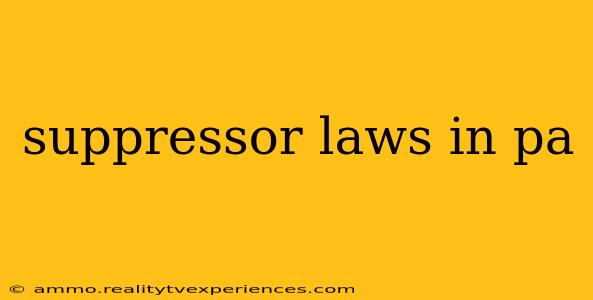Pennsylvania's laws regarding firearm suppressors, often called silencers, are complex and subject to change. This guide aims to provide a clear understanding of the current regulations, but it's crucial to remember that this information is for educational purposes only and should not be considered legal advice. Always consult with legal counsel or refer to the official Pennsylvania State Police website for the most up-to-date and accurate information.
Obtaining a Suppressor in Pennsylvania: The Process
Pennsylvania permits the ownership and use of firearm suppressors, but acquiring one involves navigating several legal hurdles. The process generally involves:
-
Federal Regulations: First and foremost, Pennsylvania follows federal regulations under the National Firearms Act (NFA). This means you must undergo a thorough background check, pay a tax stamp, and register the suppressor with the Bureau of Alcohol, Tobacco, Firearms and Explosives (ATF). This is a lengthy process, often taking several months.
-
Pennsylvania State Police (PSP) Involvement: While not directly involved in the federal registration process, the Pennsylvania State Police play a crucial role in ensuring compliance with state laws concerning firearm ownership. They maintain records and have the authority to enforce relevant regulations.
-
Dealer Licensing: You must purchase your suppressor from a licensed firearms dealer who is registered with the ATF to handle NFA items. This dealer will assist with the necessary paperwork and facilitate the ATF registration process.
Key Aspects of Pennsylvania Suppressor Laws:
Legality: Possession of a suppressor is legal in Pennsylvania, provided all federal and state regulations are met.
Registration: Federal registration with the ATF is mandatory. Failure to register a suppressor is a serious federal offense.
Permitted Uses: Suppressors are generally permitted for hunting, sport shooting, and personal protection, provided they are used legally and in accordance with all applicable laws.
Restrictions: Certain types of firearms might have restrictions on suppressor attachment. Always consult with your dealer and refer to the ATF guidelines. Moreover, some municipalities may have local ordinances that further restrict the use of suppressors.
Transfer of Ownership: Transferring ownership of a suppressor requires following the same rigorous federal registration process.
Transportation: Transporting a suppressor requires adherence to all federal and state transportation laws for firearms.
Understanding the NFA and its Impact on Pennsylvania:
The National Firearms Act of 1934 heavily influences Pennsylvania's suppressor laws. This act establishes the framework for registering and controlling NFA items, including suppressors, machine guns, and short-barreled rifles/shotguns. Understanding the NFA is paramount to lawful suppressor ownership in Pennsylvania.
Staying Informed about Changes in Pennsylvania Suppressor Laws:
Pennsylvania gun laws are dynamic, subject to legislative changes and court interpretations. It is vital to stay updated on any modifications to the state’s laws concerning suppressors. Regularly checking the Pennsylvania State Police website and consulting with legal professionals specializing in firearm law is strongly recommended.
Disclaimer: This information is for educational purposes only and does not constitute legal advice. Always consult with a qualified legal professional for advice regarding Pennsylvania suppressor laws and regulations. This information should not be considered a substitute for official legal guidance.

